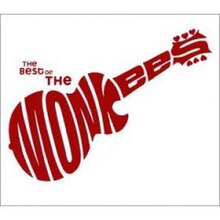This article needs additional citations for verification .(January 2007) |
| The Best of the Monkees | ||||
|---|---|---|---|---|
 | ||||
| Greatest hits album by | ||||
| Released | April 23, 2003 | |||
| Recorded | 1966–1969 | |||
| Genre | Rock, pop | |||
| Length | 1:07:56 | |||
| Label | Rhino | |||
| Producer | Andrew Sandoval | |||
| The Monkees chronology | ||||
| ||||
| Review scores | |
|---|---|
| Source | Rating |
| Allmusic | |
The Best of the Monkees is a Monkees compilation released by Rhino Entertainment. It contains 25 songs from the Monkees' repertoire, listed in chronological order by release date. Also included is a bonus karaoke CD with five tracks. Unlike previous Rhino compilations, this one does not include any material from the 1980s or 1990s reunions, focusing strictly on the band's 1960s output.
Contents
The Best of the Monkees replaced The Monkees Greatest Hits , released in 1995 in anticipation of the band's 30th anniversary celebration the following year.
The album debuted on the Billboard 200 in the issue dated May 17, 2003, at number 51. It spent six weeks on the chart. Following the death of member Davy Jones on February 29, 2012, it re-entered at No. 20 with 17,000 copies sold (up 7,808 percent according to Nielsen SoundScan) for the week ending March 4, 2012. The album has since been certified Gold for selling 500,000 copies.